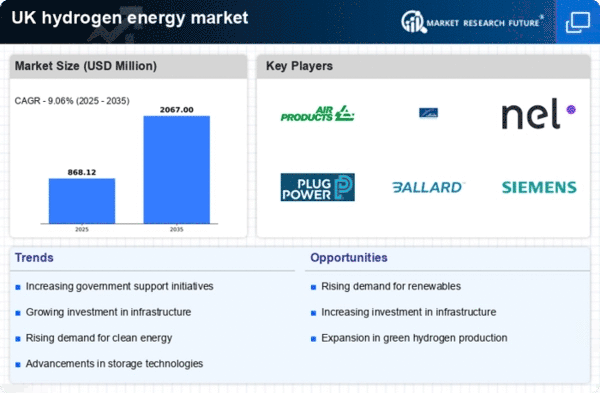Public Awareness and Acceptance
Public awareness and acceptance of hydrogen as a clean energy source are crucial for the hydrogen energy-storage market. As educational initiatives and campaigns increase, the understanding of hydrogen's benefits is likely to grow. The UK government and various organisations are actively promoting hydrogen technologies, highlighting their potential to reduce emissions and enhance energy security. This growing awareness may lead to increased consumer demand for hydrogen solutions, thereby stimulating market growth. Furthermore, as public acceptance rises, it could encourage policymakers to implement supportive regulations and incentives, further bolstering the hydrogen energy-storage market.
Rising Demand for Renewable Energy
The hydrogen energy-storage market is experiencing a surge in demand driven by the increasing need for renewable energy sources in the UK. As the government aims to achieve net-zero emissions by 2050, the transition to renewable energy is paramount. Hydrogen, as a clean energy carrier, plays a crucial role in this transition. The UK has set ambitious targets, with a goal of generating 70 GW of offshore wind energy by 2030, which necessitates effective energy storage solutions. Hydrogen energy storage can provide a viable solution to balance supply and demand, particularly during periods of low renewable generation. This growing demand for renewable energy is likely to propel the hydrogen energy-storage market forward, as stakeholders seek to integrate hydrogen solutions into their energy portfolios.
Decarbonisation of Industrial Processes
The decarbonisation of industrial processes is increasingly influencing the hydrogen energy-storage market. Industries such as steel and chemicals are under pressure to reduce their carbon footprints, and hydrogen presents a viable alternative to fossil fuels. The UK government has set a target to reduce industrial emissions by 33% by 2030, which is likely to drive the adoption of hydrogen technologies. Hydrogen can be used as a feedstock or energy source in various industrial applications, thus creating a demand for hydrogen energy storage solutions. This shift towards cleaner industrial processes is expected to significantly impact the hydrogen energy-storage market, as companies seek to invest in sustainable energy solutions.
Investment in Infrastructure Development
Investment in infrastructure development is a key driver for the hydrogen energy-storage market. The UK government has committed substantial funding to enhance hydrogen infrastructure, with plans to invest £240 million in hydrogen production and storage projects. This investment aims to create a robust supply chain for hydrogen, facilitating its integration into the energy system. Additionally, the development of refuelling stations and storage facilities is essential for the widespread adoption of hydrogen technologies. The establishment of a comprehensive infrastructure supports the growth of the hydrogen energy-storage market. It also encourages private sector investment, fostering innovation and competition within the industry.
Technological Innovations in Hydrogen Production
Technological innovations in hydrogen production are significantly shaping the hydrogen energy-storage market. Advances in electrolysis and other production methods are making hydrogen more cost-effective and efficient. The UK is witnessing a shift towards green hydrogen production, which utilises renewable energy sources for electrolysis. This transition is supported by government initiatives aimed at reducing the cost of hydrogen production to £1.80 per kg by 2030. As production technologies improve, the availability of hydrogen is expected to increase, thereby enhancing the hydrogen energy-storage market. These innovations not only lower production costs but also improve the overall sustainability of hydrogen as an energy carrier.
















